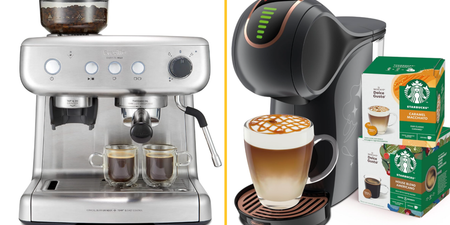Brought to you by Bluebird
Have you ever felt trapped in a cycle?
Everyone needs a routine, but the thing about a routine is that you don’t really notice what you’re doing while you’re doing it. Maybe your routine involves a flutter on the horses one a week. Maybe your routine involves going to the pub on Friday night. Maybe your routine involves spending a few hours on Sunday playing video games.
But what if your routine involves spending hundreds of pounds down the bookies, or going to the pub every night, or spending every waking hour playing video games? This is how routine becomes addiction.
When we hear the word ‘addiction’, the first place our minds go is often drink or drugs, but addiction can take many forms: sex, sugar, pornography, work, shopping, money, video games. Russell Brand talks about this wider use of the term ‘addiction’ on JOE’s new podcast Unfiltered with James O’Brien, following the publication of his new book Recovery: Freedom From Our Addictions.
Once we were hunter-gatherers; our drives were to eat, procreate and survive. Now that we have the time and freedom to indulge, indulgence can change from reward into purpose. As our society evolved from one of survival into one of service, these indulgences have not only become conveniences; they’re pushed as everyday essentials, and when a non-essential becomes essential, we stray into the realms of addiction.
“On a primal, biochemical level we’re rewarded for eating food, we’re rewarded for having sex,” Brand said in the interview. “Now an addict is someone that’s unable to moderate those impulses and those responses and gets carried away.
“We are driven by these biochemical impulses. Eat. Get status. Have sex. Be powerful. And then we have a culture that is externally, continually stimulating us and pulling that out of you.
“What I think is that consumerism is addiction writ large. Stimulus-response as a raison d’être. Stimulus-response as a way of life. That addiction is merely an amplification of what most people are feeling anyway.”
Brand makes a fair point. We’ve constructed a culture that bombards us with opportunity, desire and promise, but for things that will ultimately leave us unfulfilled.
Scantily-clad, impossibly-figured women adorn adverts with the unspoken promise that if we consume Product X, we can a) look like her or b) have sex with her…
Land and money = status. An Englishman’s home is his castle, and the sooner you can stop renting, the sooner you can pull the drawbridge up. The only way to save yourself from failure is to stack up the zeros in your bank account…
You should have the best of everything. The best TV. The best food. The best clothes. The best car. The best three-piece suite. The best kitchen. The best shoes. The best phone. The best everything. ‘Good enough’ isn’t good enough. To be the best, buy the best…
There is one model of man. He is tall, strong, with a full head of hair and a handsomely-chiselled face. He likes all the things a man should like: beer, sex, football, violence. He cries at funerals and World Cup finals and nowhere else…
There is one model of woman. Sexy but not slutty; dependent but not needy. She’s everything she’s supposed to be and yet none of it. A constant paradox, both natural and unfussy, yet never allowed to let the make-up mask slip…
And to be alone? No wife? No husband? No 2.4 children? No nuclear family? No girlfriend? No boyfriend? No one? No point.
These are the pressures we face every day. These are the voices scratching at the backs of our minds, telling us that if we get this, then we can be happy, and then if we get that, even better, but without any of it, there’s no chance.
As Russell Brand said on Unfiltered, “It’s like the worst aspects of our nature are what we have elected to build a culture around.”
And the pressures are real, inflicted from an early age. A poll commissioned by publisher Bluebird and youth charity The Mix found that not having enough money was the largest source of young people’s stress (60%) and that 75% of young people turned to drink, drugs, sex, shopping, social media, eating and exercise to deal with their stress.
These are people under the age of 25, with two-thirds of their life hopefully still left to live. What have they been condemned to?
No one sat down one day and said, “This is the society we’re going to build. It will be based on the consumption of things and the exchanging of money for goods and services, instead of love, friendship and compassion.” This is simply the way that things developed over thousands of years of civilisation. That, and it’s difficult to turn a profit on compassion.
The unfortunate truth, however, is that civilisation was built on exploitation, whether by means of physical force or subtle seduction. While our hands and feet may not be in chains, we are caught in the cycle of consumption. We all feel the pull to get the next thing, whether that’s a bigger house, a new car, a more attractive partner or a bigger salary.
It’s impossible to deny that these things work: we do feel good when we buy a new TV, we do feel good when we get a raise, we do feel good when our Instagram posts get more likes than usual. Approval, status, capital – we crave them, and when we get them, we’re happy. The satisfaction is fleeting, though. It’s a fix; it’s not an answer.
Change is possible. These cravings, these cycles, they can be broken. Russell Brand certainly thinks so:
“I think that how you reach people [is], you say, ‘Look, are you happy? How do you feel in the world? Do you believe it’s possible for the world to change?’ Well, I’m telling you, I think it is possible for the world to change, and the people that are telling you the world can’t change are the people who don’t want it to because it’s working well for them.
“This is how it changes: get yourself as close to power as possible. You should be controlling your workplaces. You should be controlling your own emotional life. If there’s something you don’t like about yourself, it is possible to change it. You think you’re eating too much? You can get help with that. You think you’re looking at porn too much? You can get help with that.”
The point he’s making is that your life is within your control, you just have to take it back. If that requires the help of others, reach out for that help. If it requires willpower, apply it. If all it takes is for you to just stop and think about it, maybe you’ve just taken that step.
Recovery: Freedom From Our Addictions by Russell Brand is out now.
Russell’s episode of Unfiltered with James O’Brien is available on iTunes, SoundCloud and YouTube now.













































